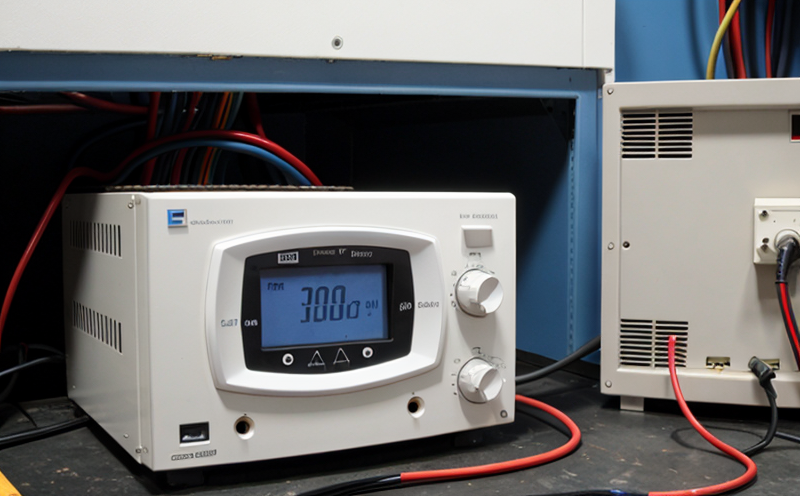IEC 60929 Electrical Testing of Fluorescent Lamp Ballasts
The International Electrotechnical Commission (IEC) Standard 60929 provides a framework for the electrical testing of fluorescent lamp ballasts, which are essential components in lighting systems. These ballasts regulate the current to ensure that fluorescent lamps operate efficiently and safely. The standard is crucial for quality managers, compliance officers, R&D engineers, and procurement teams as it ensures that products meet international safety and performance requirements.
The IEC 60929 standard covers a wide range of electrical parameters including power factor correction, input/output impedance matching, harmonic distortion levels, and efficiency. Compliance with this standard is mandatory for fluorescent lamp ballasts intended for sale in Europe, where the standard has been harmonized into national standards like EN 50530.
The testing process involves several critical steps, each aimed at verifying that the ballast meets the specified performance criteria:
- Power Factor: Ensures that the electrical current drawn by the ballast is in phase with the voltage. This minimizes power losses and ensures efficient operation.
- Harmonic Distortion Levels: The standard specifies limits on harmonic distortion to ensure that the ballast does not introduce excessive noise into the electrical supply, which could affect other devices connected to the same circuit.
- Efficiency: Measures the ratio of output power to input power. A more efficient ballast will have less energy loss and thus reduce operating costs over time.
- Impedance Matching: Ensures that the electrical load presented by the ballast is compatible with the supply voltage, preventing damage to both the lamp and the circuitry.
The testing process typically involves laboratory equipment such as power supplies, oscilloscopes, and harmonic analyzers. These instruments are used to measure various parameters under controlled conditions that mimic real-world operating environments. The test results are then compared against the specified limits outlined in IEC 60929 to determine compliance.
Compliance with IEC 60929 is not only a regulatory requirement but also a critical factor for quality and safety. Non-compliance can lead to product recalls, legal issues, and damage to brand reputation. By adhering to this standard, manufacturers ensure that their products are safe, efficient, and reliable.
The implementation of IEC 60929 is important not only in Europe but also globally as it promotes a level playing field for lighting manufacturers. This ensures that all products meet the same high standards, enhancing consumer confidence and safety across borders.
Why Choose This Test
Selecting IEC 60929 electrical testing for fluorescent lamp ballasts is essential for several reasons:
- Regulatory Compliance: The standard ensures that products meet international safety and performance requirements, which are crucial for market access.
- Safety Assurance: By adhering to the specified parameters, manufacturers can ensure that their ballasts do not pose a risk to users or other connected devices.
- Efficiency Optimization: Testing helps in optimizing power factor and efficiency, reducing energy consumption and operational costs.
- Quality Control: Regular testing provides insights into the quality of production processes, helping manufacturers identify and rectify any issues early on.
- Certification Advantage: Compliance with IEC 60929 can enhance a company's reputation and provide a competitive edge in the market.
- Customer Satisfaction: Meeting safety and performance standards ensures that customers receive products they can trust, enhancing overall satisfaction.
The benefits of choosing this test extend beyond compliance; it also fosters innovation by encouraging manufacturers to explore advanced technologies and designs. This proactive approach helps maintain a high standard in the industry, benefiting both consumers and businesses.
Customer Impact and Satisfaction
The impact of IEC 60929 electrical testing on customers is profound. By ensuring that fluorescent lamp ballasts meet strict safety and performance standards, this testing enhances the overall quality of lighting products. This not only improves customer satisfaction but also contributes to a safer and more efficient use environment.
Customers benefit from:
- Better Performance: Products that comply with IEC 60929 are known for their reliability, ensuring consistent performance over time.
- Reduction in Energy Costs: Efficient ballasts reduce energy consumption, leading to lower operational costs and a positive environmental impact.
- Increased Safety: Compliance with the standard minimizes risks associated with electrical hazards, providing peace of mind for users.
- Eco-Friendly Solutions: The standard promotes the use of environmentally friendly technologies, aligning with global sustainability goals.
By choosing products that have undergone IEC 60929 testing, customers can be confident in their purchase decisions. This trust fosters long-term relationships and enhances brand loyalty.
Use Cases and Application Examples
- Commercial Buildings: Fluorescent lamp ballasts are commonly used in commercial spaces to provide efficient lighting solutions while minimizing energy consumption. Testing ensures that these systems operate safely and efficiently.
- Industrial Facilities: Industrial environments require robust and reliable lighting systems, which can benefit from the stringent testing provided by IEC 60929.
- Schools and Hospitals: In these critical facilities, safety is paramount. Testing ensures that the lighting systems are not only efficient but also safe for occupants.
- Residential Settings: Homeowners seeking energy-efficient solutions can benefit from products that have undergone IEC 60929 testing.
The real-world application of this test is vast, and its impact on various sectors cannot be understated. By ensuring compliance with international standards, the testing process plays a crucial role in enhancing product quality and safety across different industries.





